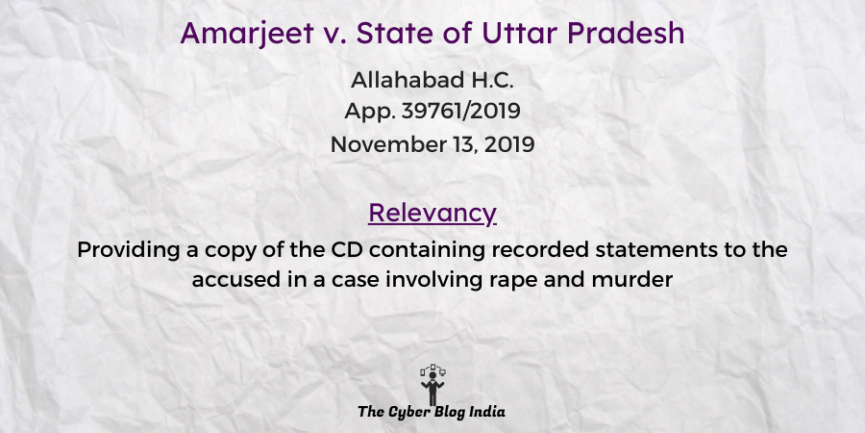Amarjeet v. State of Uttar Pradesh

Amarjeet v. State of Uttar Pradesh
In the High Court of Allahabad
App. 39761/2019
Before Justice Dinesh Kumar Singh
Decided on November 13, 2019
Relevancy of the case: Providing a copy of the CD containing recorded statements to the accused in a case involving rape and murder
Statutes and Provisions Involved
- The Information Technology Act, 2000 (Section 66)
- The Indian Penal Code, 1860 (Section 302, 307, 201, 376D, 394, 411, 120)
- The Protection of Children from Sexual Offences Act, 2012 (Section 3, 4)
- The Code of Criminal Procedure, 1973 (Section 207, 238, 482, 164)
Relevant Facts of the Case
- The informant filed an FIR stating that when he had gone to bring fodder from his field, his daughter, the victim (12 yrs), and his son, Nitin (10 yrs), were at home.
- His nephew gave the information to him that his son had sustained a knife injury in his neck. He then rushed home and could not find his daughter. The informant went to the hospital, where his son was admitted. After his son regained consciousness, he disclosed that the accused and the co-accused committed rape upon his sister.
- When the informant reached home, he saw that his household goods were scattered, and jewellery, along with other valuables, were missing.
- When the police searched for his daughter, she was naked and dead in a room beneath the straw. Hence, he lodged a first information report against the accused and the co-accused.
- Nitin’s statement was video recorded on a CD, which was part of the case diary. The applicant’s counsel prayed that he be provided with a copy of the same. Still, his application was illegally rejected, and the current application is filed to quash the impugned order.
- It was also noted that the Investigating Officer, who recorded the statement on the CD, also served as an important witness. But when he appeared in front of the trial court, the CD was cracked and unreadable.
Opinion of the Bench
- The Court relied on Tarun Tyagi v. Central Bureau of Investigation, in which it was observed that copies of seized CDs were required to be supplied to the appellant.
- Further, relying on the case V K Shashikala v. State, the Court observed that duty was cast on the Investigating Officer to examine the two sets of documents, that is, those supporting the prosecution as well as the accused and if required, to acquit the accused at that stage itself. But the same would not be possible if the Investigating Officer ignores the seized documents which favour the accused and presents the ones which support the prosecution.
- Hence, if such a situation is pointed out by the accused, and if such documents have been forwarded to the Court, then the Court must make such documents available to the accused under Section 207 of the Code of Criminal Procedure, 1973.
Final Decision
- Application allowed.
This case summary has been prepared by Loreal Sahay, an undergraduate student at University School of Law and Legal Studies, GGSIPU, during her internship with The Cyber Blog India in January/February 2021.
